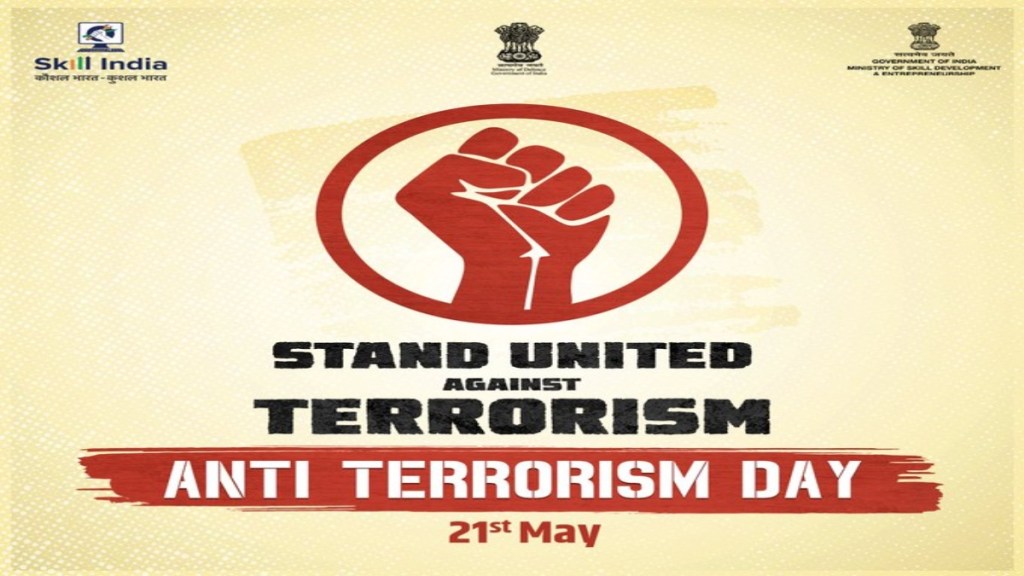By- Farooq Wani
National Anti-Terrorism Day is observed in India on May 21 every year and this particular day has been selected as it was on this day in 1991 that the then Indian Prime Minister Rajiv Gandhi, was assassinated at Sriperumbudur, a village near Chennai by female LTTE (Liberation Tigers of Tamil Eelam) suicide bomber. It was the VP Singh government that declared May 21 as Anti-Terrorism Day in India was aimed at increasing awareness and educating the public about the scourge of terrorism and the havoc it wreaks on society and the nation.
Ever since the eighties, India has been a victim of Pakistan sponsored terrorism in Punjab through the Khalistan movement demanding a separate state for members of the Sikh community. This led to bloodshed on a scale not seen since partition with a spate of senseless killings the most reprehensible being the assassination of the then Indian Prime Minister Indira Gandhi in 1984 and the mid-air blowing up Air India Flight 182 in 1985 that killed all 329 people aboard.
By the early nineties, the Indian security forces and law enforcement agencies with remarkable cooperation from the public were able to break the backbone of this ISI orchestrated secessionist movement. However, miffed by its failure in Punjab, Pakistan widened the scope of its proxy war against India by training, arming and providing logistic support to Kashmiri youth and that has claimed thousands of innocent lives.
Since India is a victim of terrorism directly sponsored by Pakistan and has suffered immensely on this account, it unconditionally condemns every action that involves use of force to achieve any objective. New Delhi’s bottom line is clear- no amount of aggravation justifies violence in any form and its firm and unambiguous stand on terrorism has widely been appreciated by the international community. However, duplicity on this issue exhibited by some very influential countries like China is encouraging Pakistan to use terror as a state policy.
According to the 10th edition of the Global Terrorism Index, India ranked among the 25-worst terror-hit countries but also among 56 of the 120 nations surveyed with no respondents selecting war and terror as the biggest threat to their daily safety. The report by Sydney-headquartered think-tank noted that India has a number of low-level conflicts in some of the border areas.
Despite international condemnation of terrorism, victims and survivors of terrorism often struggle to have their voices heard, their needs supported, and their rights upheld. Victims often feel forgotten and neglected once the immediate aftermath of a terrorist attack fades, leaving them to rnd for themselves. Few nations have the resources or the capacity to fulfill the medium and long-term needs of victims of terrorism to enable them to fully recover, rehabilitate and reintegrate into society. Most victims can only recover and cope with their trauma through long-term multi-dimensional support, including physical, psychological, social and financial.
While UN member States have the primary responsibility to support victims of terrorism and uphold their rights, the United Nations needs to play a more assertive role as regards supporting member states to implement the UN Global Counter-Terrorism Strategy. Mere rhetoric, expression of helplessness and failure to come down heavily on instances of terrorism being used as a foreign policy tool is only encouraging this dangerous trend.
Simultaneously, the United Nations needs to evolve a more efficient relief mechanism that goes beyond meaningless gestures like merely condemning terrorist acts and expressing solidarity with terrorism victims. It needs to institute measures to provide support to victims of terrorism; offering capacity building assistance; establishing networks; and offering support to civil society organizations, particularly victims’ associations; and encouraging Member States to promote, protect and respect the rights of victims of terrorism.
The United Nations needs to provide better technical assistance and capacity-building to member States and victims’ associations in better addressing the needs of victims of terrorism.

